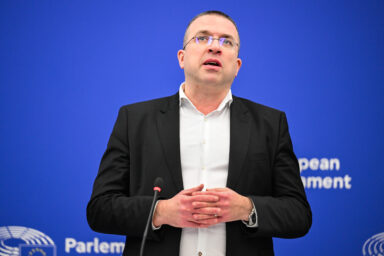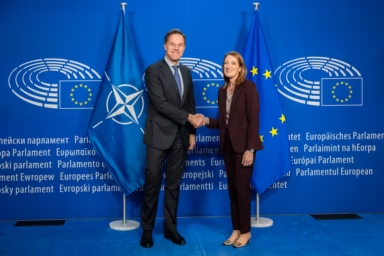Micromanaging local legislation dealing with short-term rentals is not the European Commission’s job, Vice-President Stéphane Séjourné told the European Parliament. Instead, the Union’s executive arm will provide a legal framework, plus a plan to build affordable housing.
The European Parliament’s Housing Committee met in Strasbourg on 9 October to wrestle with two intertwined challenges: short-term rentals and the broader housing crisis. The discussion featured European Commission Vice President Stéphane Séjourné, who laid out the Commission’s stance in the face of MEPs‘ scathing criticism.
Mr Séjourné began by hailing Parliament’s research efforts across member states and local actors. “Access to fairly priced and decent housing is what young people need as they move through life,” he said, framing the issue as one that transcends economics. “It’s a crisis that is really at the core of what it means to live together.”
The Commissioner acknowledged the crisis’ complexity, stressing its dual economic and social nature, and flagged reducing the supply-demand gap as urgent. The Commission will publish a plan for affordable housing by year’s end, he noted, promising a strategy centred on construction competitiveness, streamlining permits, boosting skills and innovating markets for materials.
You might be interested
Regulate tourism
Short-term rentals, however, immediately drew scrutiny. MEP Nikolina Brunjak (EPP/HRV) flagged them as a significant factor, particularly in tourist-heavy destinations where they often form over 20 per cent of the housing stock. This, she said, pushes rents up and squeezes locals out. Moreover, she highlighted the overlooked pressures on local infrastructure: traffic, water, waste disposal. She urged policies built on “data monitoring and designing policies based on evidence and exact data.”
Ms Brunjak praised Croatia’s Tourism Act, which enables local authorities to limit or regulate short-term rentals where necessary, suggesting it could serve as a blueprint at EU level. Notably, she recalled that President von der Leyen “confirmed that… the Commission will start preparing a legislative proposal for regulating the short-term rentals… because we have to have the limit.”
Subsequent debate pinpointed the tension between swift action and legal certainty. MEP Gabi Bischoff (S&D/DEU) welcomed the Commission’s intent but sought clarity on timing and scope, stressing the urgency in cities where “nurses, teachers can’t live… it’s much more lucrative to offer short-term rentals to tourists.” She pressed for concrete proposals, urging the Commission to “come back to us with concrete proposals,” reflecting demands from mayors grappling with these problems on the ground.
Efficacy and co-desision
Mr Séjourné responded with a careful distinction. The matter affects “all European countries, but differently,” he said, depending on tourist inflows and local contexts. Yet he firmly rejected EU micromanagement. “We’re not going to be substituting the cities and setting up… local legislation. It’s not the Commission’s role to get down into the nitty-gritty,” he insisted.
Instead, the Commissioner proposed two practical approaches: issuing clear guidelines clarifying the compatibility of local measures with Union law, or establishing a legal framework within which local authorities can act. “Those… allow us to act swiftly,” he said. He added, however, that formal co-decision procedures would take time. “We need to strike a balance, swiftness and efficacy of our recommendations… while also thinking about co-decision.”
It’s not the Commission’s role to get down into the nitty-gritty. — Stéphane Séjourné, EC Vice-President
The housing crisis itself—widening and deepening—drew sober reflections from MEP Julie Rechagneux (PfE/FRA). She argued that EU policies sometimes exacerbate the problem. Environmental standards, strict construction regulations, and migration policies, she claimed, have inflated costs and slowed supply. The current EU energy market, she said, adds upward economic pressure.
The French know best
“The EU has, in fact, suffocated local action. France’s experience suggests local actors know best,“ Ms Rechagneux said, calling for a move away from “zero land take” ideals and calling for reform of energy efficiency rules to reduce material costs. She urged measures that promote social housing not as permanent shelter but as a stepping stone to home ownership.
MEP Antonella Sberna (ECR/ITA) painted a nuanced portrait: the housing emergency demands welfare and cohesion policies that work for citizens. While supporting transparency in short-term rentals, she warned against penalising market realities.
The Italian conservative MEP noted the role of short-term rentals in socio-economic development in Italy’s rural areas, where tourism supports communities. “We need regulation that respects… the various needs… but also… local development.” Highlighting that construction contributes nine per cent of EU GDP, she emphasised balancing housing supply with economic vitality.
Legal certainty matters
On simplification, competitiveness and quality, Mr Séjourné remained firm and philosophical. He envisioned an EU framework that drives scale but respects subsidiarity. “It’s not the role of the European Commission… to say what Barcelona should do, or what Paris should do.” The goal, he said, is legal certainty for local measures, avoiding “any conflicts” or “issues with case law.” He judged that the Parliament and Commission agree on the importance of the issue; now they must “come up with a way of ensuring legal certainty.”
MEP Jana Toom (Renew/EST) wanted specifics. “Is there anything we can do to leverage the power of a single market to help the construction sector bring down the cost of building?” she asked. She proposed using the Industrial Decarbonisation Act and Net-Zero Industry Act to back modular and circular methods and pressed for looser state-aid rules to let governments invest.
Mr Séjourné agreed that innovation helps but insisted finance matters too. “We have begun work on a new framework… which ought to be more flexible in terms of the construction sector.” Guarantees under InvestEU and the EIB could de-risk projects, he said, yet Parliament must endorse them in the budget.
Infringement proceedings
Attention then switched to short-term lets. MEP Marie Toussaint (Greens-EFA/FRA) found it perverse that infringement cases linger while cities suffer. “I find it strange that we can’t take action on short-term rentals before next May,” she said, noting Airbnb’s Irish base and the “unfair competition” that follows.
You say the Commission cannot do much. Now, this is what you can do: drop the infringement proceedings. — MEP Marie Toussaint (Greens-EFA/FRA)
Ms Toussaint urged the Commission to drop legal threats aimed at countries erecting their own barriers against short-term rental deluge. „You said the Commission couldn‘t do much. Now, this is something you can do: drop the infringement proceedings.“
The commissioner replied that progress is under way. “We are currently doing away with (infringement proceedings) one by one. The French proceeding has been dealt with.” Full transparency will only bite in 2026, but guidelines can arrive sooner. On public procurement, he promised balance: European criteria must back “social resilience” yet keep bids competitive.
Health standards surfaced next. People die from Legionella and Salmonella, Ms Toussaint warned, so Brussels should craft rules for “homes fit to be lived in.” Mr Séjourné sympathised but issued a caveat. “We don’t want these criteria to be counterproductive with regard to our other aims of driving down the price of housing and making housing more affordable.”
Criminal cash, soaring rents
MEP Martin Schirdewan (Left/DEU) claimed property is “very susceptible to money laundering” and that lighter permits risk more corruption. Listed landlords, he said, “are benefiting from this particular crisis on the housing market.” With Berlin rents hitting €20 a square metre, he demanded caps and an ex-ante duty on platforms such as Airbnb to shoulder compliance costs.
The commissioner refused blanket controls. “We can’t establish prices neighbourhood by neighbourhood or town by town,” he said. What Brussels can supply is “a framework… which would provide security for any decisions made.” Local leaders must know their curbs on short-term lets stand up in court, yet regions reliant on tourism also need supply.
Nurses, teachers can’t live… it’s much more lucrative to offer short-term rentals to tourists. — MEP Gabi Bischoff (S&D/DEU)
Mr Séjourné warned against universal fixes. “We don’t want to have a one-size-fits-all approach to these myriad problems.” His December package will bundle legislative and non-legislative tracks, while prudential rules dating from 2008 may also be revisited to ease credit for builders. For now, he urged MEPs to table concrete ideas because “short-term rentals is an urgent issue, we have to take action quickly.”
The right kind of regulation
The meeting underscored the tightrope the EU must walk: balancing overarching frameworks with local autonomy, innovation with regulation, and rapid response with legal clarity. Short-term rentals may be a visible lightning rod, but the deeper crisis demands systemic shifts in construction, market competitiveness and social policy.
As Mr Séjourné put it, “Reducing the gap between supply and demand for housing is one of the priorities that I find to be the most urgent. With the right kind of EU regulation, we can break down barriers and drive down prices,” the Comissioner ended up on an opimitic note, pledging to present the Commission’s proposals on the matter as soon as on 16 December.











